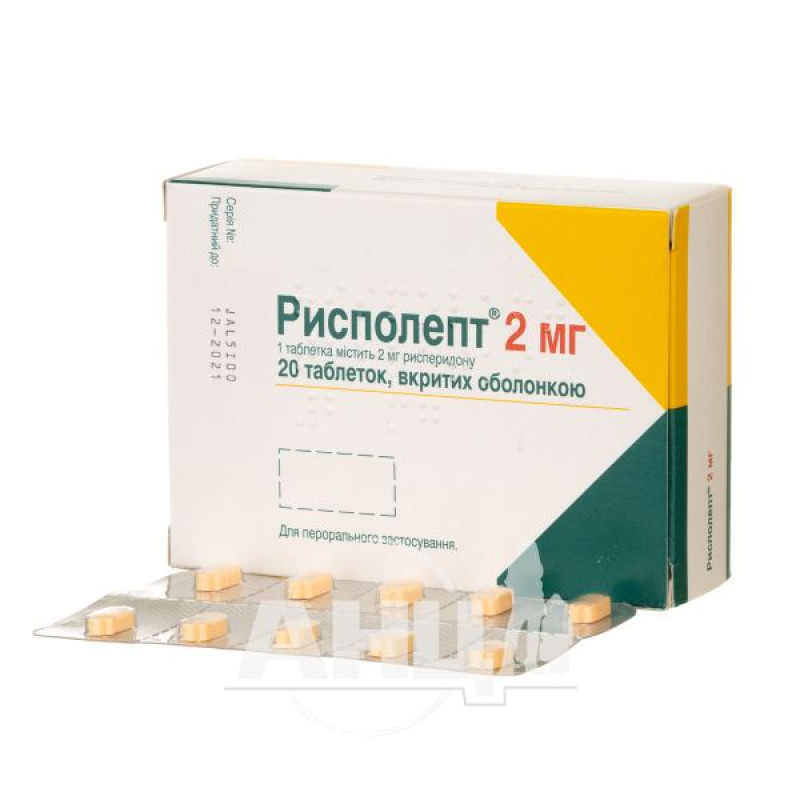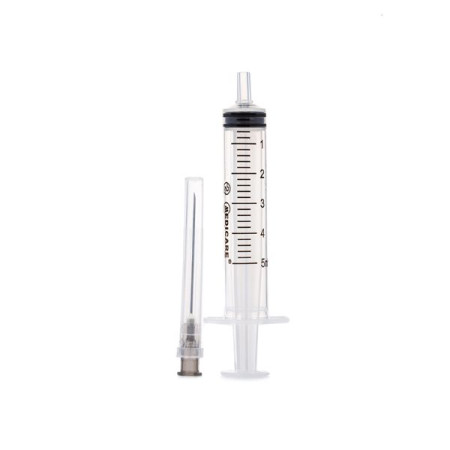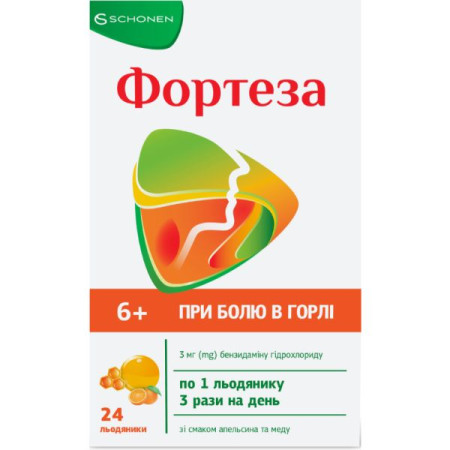Rispolept film-coated tablets 2 mg blister No. 20

Pharmacological properties
Antipsychotic drug, a derivative of benzisoxazole. A selective antagonist of 5-HT 2-serotonergic and d2-dopaminergic receptors in the CNS, also blocks α1-adrenergic and to a lesser extent histamine H1- and α2-adrenergic receptors; does not act on cholinergic receptors. Although risperidone is a potent d2-antagonist, which is due to its effectiveness in relation to the productive symptoms of schizophrenia, it does not cause significant inhibition of motor activity and induces catalepsy to a lesser extent compared to classical neuroleptics. The balanced central antagonistic effect on serotonin and dopamine reduces the likelihood of developing extrapyramidal side effects and expands the therapeutic spectrum of the drug to cover the negative and affective symptoms of schizophrenia.
Risperidone is completely absorbed after oral administration. Peak plasma concentrations are reached within 1-2 hours, and the volume of distribution is 1-2 l/kg. Food intake does not affect the absorption of the drug. Risperidone is metabolized by cytochrome P450 IID6 to 9-hydroxyrisperidone, which is pharmacologically active. Another metabolic pathway is N-dealkylation. The half-life of risperidone is about 3 hours, and that of risperidone and 9-hydroxyrisperidone is 24 hours. Steady-state concentrations of risperidone are reached in most patients within 1 day. Steady-state concentrations of 9-hydroxyrisperidone are reached within 4-5 days. The plasma concentration of risperidone is proportional to the dose of the drug (within the therapeutic dose range).
Risperidone is 88% bound to plasma proteins (albumin and α1-acid glycoprotein) and 77% bound to 9-hydroxyrisperidone. One week after dosing, 70% of the dose is excreted in the urine and 14% in the feces. 3-45% of the dose is excreted in the urine as risperidone and 9-hydroxyrisperidone, the rest as inactive metabolites. High plasma concentrations and delayed elimination have been observed in elderly patients with renal insufficiency. Normal plasma concentrations of risperidone have been observed in patients with renal insufficiency.
Indication
Schizophrenia (acute and chronic) and other psychotic conditions with pronounced productive symptoms (hallucinations, delusions, thought disorders, aggressiveness) and/or negative symptoms (emotional and social alienation, poor speech); to reduce affective symptoms (anxiety, fear, depression) in patients with schizoaffective disorders and schizophrenia; as a means of long-term maintenance therapy to prevent relapses in chronic schizophrenia; behavioral disorders in patients with dementia with symptoms of aggression (verbal outbursts, physical violence), behavioral disorders (anxiety, agitation) or with a predominance of psychotic symptoms; as an additional means in the treatment of manic episodes in bipolar disorders (episodes are characterized by elevated, expansive or irritable mood, increased self-esteem, decreased need for sleep, accelerated speech, scattered thoughts, inability to concentrate and rejection of criticism, as well as antisocial or aggressive behavior.
Application
Adults are prescribed the drug in an initial dose of 2 mg/day. On the 2nd day, the dose is increased to 4 mg/day in 1 or 2 doses. Subsequently, the maintenance dose of the drug is individually set, which is usually 4-8 mg/day. At a dose above 10 mg/day, the effectiveness does not increase, but the risk of developing extrapyramidal disorders increases. The maximum daily dose is 16 mg. If there is a need for additional sedative effect, benzodiazepines can be added to Rispolept therapy.
In elderly patients or in patients with severe liver and/or kidney dysfunction, an initial dose of 0.5 mg 2 times a day is recommended, which can be increased to 1-2 mg 2 times a day.
Treatment of behavioral disorders in patients with dementia is started with a dose of 0.25 mg 2 times a day. The optimal dose for most patients is 0.5 mg 2 times a day, for some patients the effective dose can be increased to 1 mg 2 times a day. After reaching an effective dose, the patient can receive the drug 1 time a day.
The recommended starting dose for bipolar disorder is 2 mg/day. The dose may be increased by 2 mg/day no more frequently than every other day. The optimal dose for most patients is 2-6 mg/day.
Contraindication
Hypersensitivity to the drug.
Most often - insomnia, agitation, anxiety, headache, less often - drowsiness, increased fatigue, dizziness, impaired coordination, constipation, dyspepsia, nausea or vomiting, abdominal pain, blurred vision, priapism, erectile dysfunction, ejaculation disorders, orgasm disorders, urinary incontinence, rhinitis, skin rashes and other allergic reactions. Risperidone is much less likely to cause extrapyramidal symptoms than classical neuroleptics, however, in some cases, such extrapyramidal symptoms as tremor, rigidity, hypersalivation, bradykinesia, akathisia, acute dystonia may occur. These symptoms are usually mild and resolve with a dose reduction and/or the appointment (if necessary) of antiparkinsonian agents. Sometimes when prescribing Risperidone, orthostatic hypotension, reflex tachycardia or atrial fibrillation, slight neutropenia or thrombocytopenia were observed. Risperidone can induce dose-dependent hyperprolactinemia, which can manifest itself in the form of galactorrhea, gynecomastia, menstrual disorders and amenorrhea. During treatment with Risperidone, weight gain, the development of angioedema and increased activity of liver enzymes were noted. Cerebrovascular manifestations were noted mainly in elderly patients. Hyperglycemia and progression of diabetes mellitus were noted in very rare cases. As with the use of classical neuroleptics, but to a much lesser extent, in patients with schizophrenia, the following were observed: hyperhydration in connection with polydyspepsia or syndrome of inappropriate secretion of antidiuretic hormone, tardive dyskinesia, neuroleptic malignant syndrome, thermoregulation disorders and convulsions.
Special instructions
Orthostatic hypotension may occur during treatment, especially in the initial period when the dose is selected. Risperidone should be used with caution in patients with diseases of the cardiovascular system (heart failure, myocardial infarction, conduction disorders), as well as in cases of dehydration, hypovolemia or cerebrovascular disorders; the dose should be increased gradually, in accordance with the recommendations. If hypotension occurs, a dose reduction should be considered.
Tardive dyskinesia, a condition characterized by involuntary rhythmic movements (mainly of the tongue or facial muscles), has been reported with dopamine receptor antagonists. Extrapyramidal symptoms have been reported to be a risk factor for tardive dyskinesia. Risperidone is less likely to cause tardive dyskinesia than classical neuroleptics. If symptoms of tardive dyskinesia occur, consideration should be given to discontinuing all antipsychotic drugs.
When using classical neuroleptics, cases of neuroleptic syndrome, characterized by hyperthermia, muscle rigidity, instability of autonomic functions, impaired consciousness and increased blood CK levels, have been described. In the event of neuroleptic syndrome, all antipsychotic drugs, including Risperidone, should be discontinued.
It is recommended to halve both the initial and subsequent maintenance dose in elderly patients and in patients with renal insufficiency.
Caution should be exercised when prescribing rispolept to patients with Parkinson's disease, as it may cause a worsening of the disease.
Classical neuroleptics lower the seizure threshold for epileptic seizures, so it is recommended to use Risperidone with caution in patients with epilepsy.
Patients should be advised to follow a diet due to the possibility of weight gain.
During treatment, it is recommended to refrain from performing work that requires increased concentration of attention and speed of mental and motor reactions.
The safety of Risperidone during pregnancy has not been established, therefore Risperidone should be used during pregnancy only if the potential benefit to the mother outweighs the potential risk to the fetus. Women taking Risperidone should not breastfeed.
Interactions
Risperidone should be used with caution in combination with other centrally acting drugs. Risperidone may have antagonistic effects on levodopa. When using carbamazepine, a decrease in the concentration of risperidone in the blood plasma was noted. Similar effects may be observed when using other inducers of liver enzymes. When canceling carbamazepine and other inducers of liver enzymes, the dose of risperidone is reduced if necessary.
Phenothiazines, tricyclic antidepressants and some α-blockers may increase the plasma concentration of risperidone. Fluoxetine may increase the plasma concentration of risperidone. If Risperidone is used together with other drugs that are extensively bound to plasma proteins, then clinically significant displacement of the drug from protein binding is not observed.
It was reported that 360 mg of the drug was taken. It is manifested by drowsiness, sedation, tachycardia, arterial hypotension, extrapyramidal disorders, in rare cases - prolongation of the QT interval. There is no specific antidote. Perform gastric lavage, prescribe activated charcoal, ensure airway patency, adequate ventilation and oxygenation, constant medical supervision, monitor the function of the cardiovascular system, including ECG to detect arrhythmias, conduct symptomatic and supportive therapy. In case of hypotension and collapse, perform intravenous infusion of plasma substitutes and administer sympathomimetics. In case of acute extrapyramidal symptoms, prescribe anticholinergic drugs.
Storage conditions
At a temperature of 15-30 °C. Do not freeze.
There are no reviews for this product.
There are no reviews for this product, be the first to leave your review.
No questions about this product, be the first and ask your question.
















